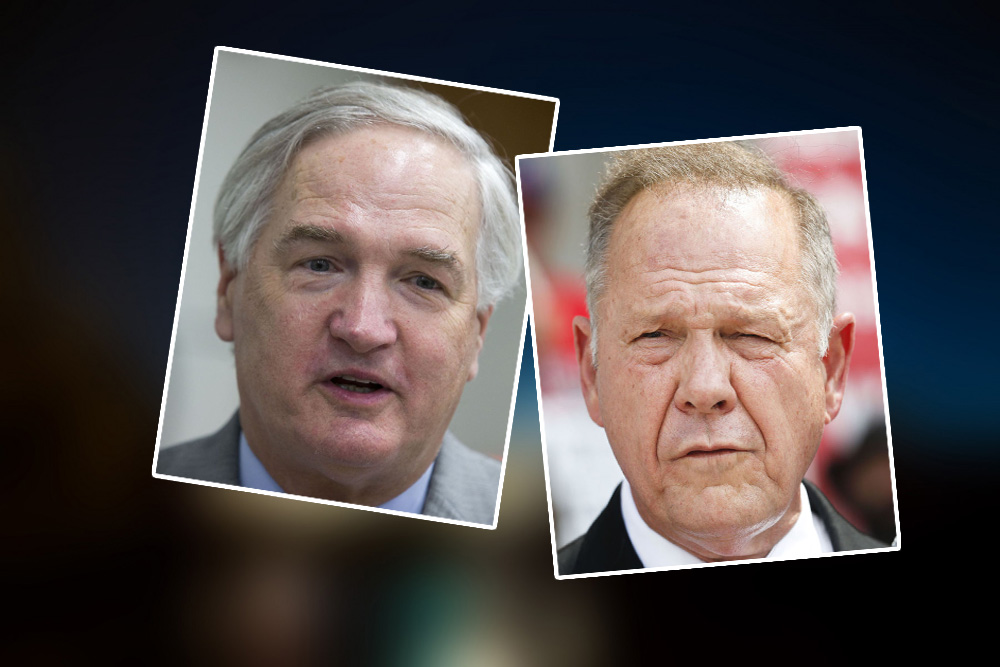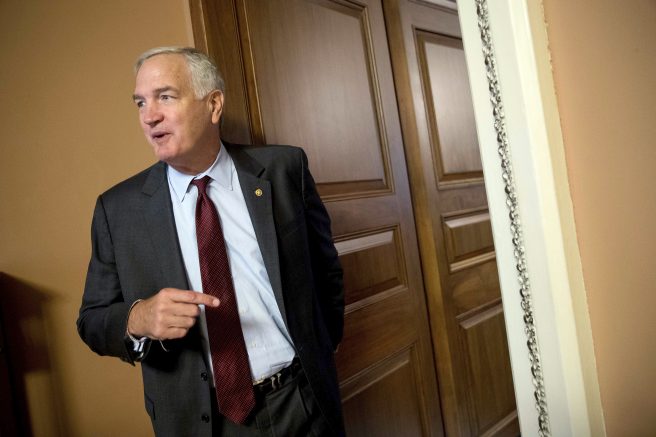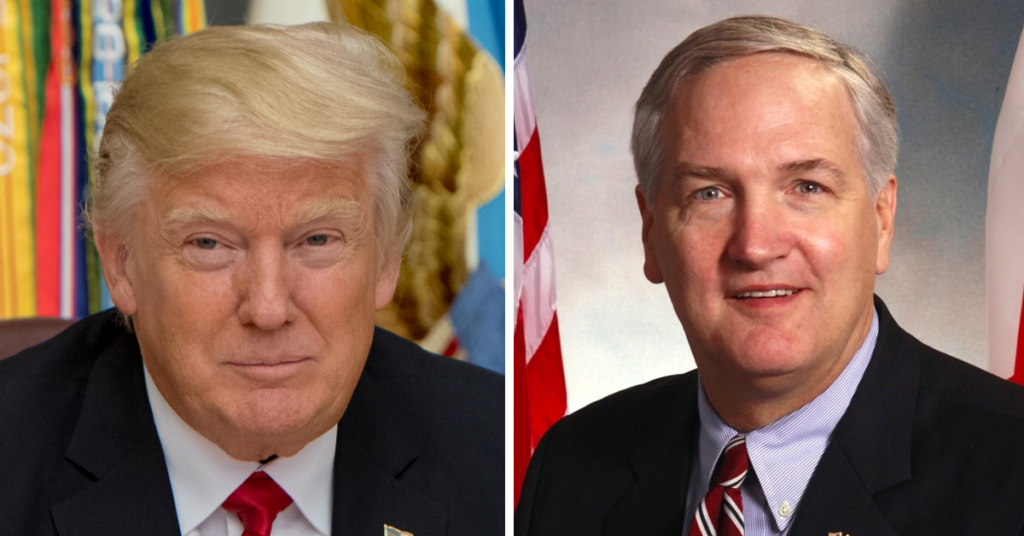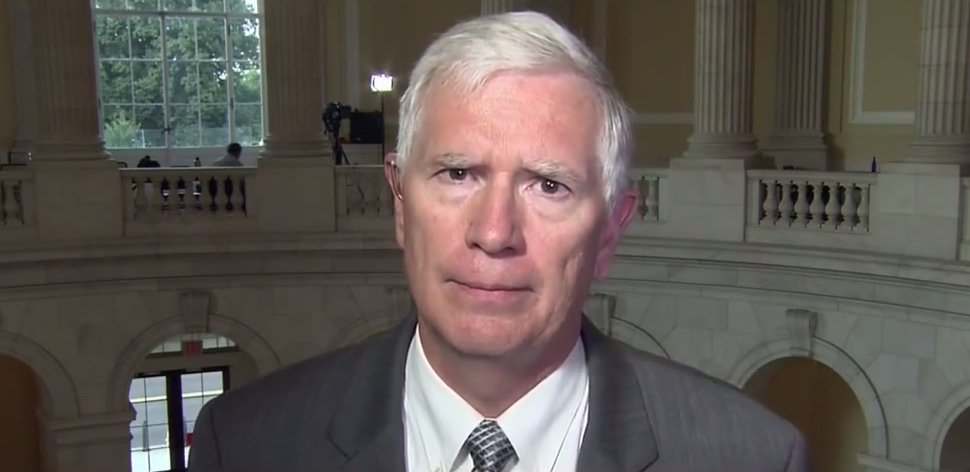Roy Moore, Luther Strange move to runoff for Ala. U.S. Senate race

Former Alabama Supreme Court Chief Justice Roy Moore and sitting Sen. Luther Strange will face off in a runoff election to decide the Republican nominee for the rest of Jeff Sessions’ Senate term. Republicans voting Tuesday did not give a single candidate more than 50 percent of the vote, resulting in the top two vote-getters moving on to a runoff election Sept. 26. Republican voters gave Moore an 8-point lead over Strange, 40 to 32 percent, with 66 of 67 counties reporting. Huntsville Republican Congressman Mo Brooks came in third at 20 percent, with state Sen. Trip Pittman of Baldwin County getting seven percent and Alabama Christian Coalition president Randy Brinson with less than one percent. Unofficial results put turnout at about 15 percent, with 500,390 votes cast of 3,281,781 total registered voters. More than 376,000 Republicans cast ballots. Other Republican candidates receiving less than one percent include Dr. James Beretta, Joseph Breault, Mary Maxwell and Bryan Peeples. The contentious primary featured bitter accusations between Strange and Brooks, which cast no small doubt on whether the sitting incumbent — who enjoyed endorsements from both President Donald Trump and Senate Majority Leader Mitch McConnell — could come in either first or second. What did not help was that Strange was appointed in February by then-Gov. Robert Bentley, who later resigned in disgrace after a sex scandal. Strange also struggled with his association with McConnell, whose popularity plummeted among Republicans. Brooks constantly hammered McConnell, calling the Majority Leader the Senate’s “Swamp King.” McConnell’s Senate Leadership Fund had run waves of negative ads during the primary — many supporting Strange, but much more against Brooks, calling him a “career politician” and blasting his nonsupport of Trump in 2016. Late in the race, Strange finally received Trump’s endorsement (on Twitter), even though Strange also did not publicly endorse the New York real estate mogul during last year’s presidential primaries. As for Democrats, former federal prosecutor Doug Jones looks to be winning the primary outright with more than 61 percent of the votes cast. Jones, received a late-primary endorsement from former Vice President Joe Biden. While he led polling throughout the primary season, Kennedy’s name recognition — despite being unrelated to the famous Kennedy clan — helped earn him only 21 percent of Democratic primary voters. Other Democrats in the race were pastor Will Boyd, a former Greenville, Illinois City Councilman (who received six percent); Talladega County Constable Vann Caldwell, businessman Jason Fisher (two percent); activist Michael Hansen (who also received seven percent) and Charles Nana. Given Alabama’s strong Republican lean (the state elected Trump by nearly 28 points over Hillary Clinton), whoever wins the runoff — either Moore or Strange — will most likely represent the state in the U.S. Senate. The general election is Dec. 12.
Dr. Eric Ostermeier: Will Luther Strange lose Alabama’s GOP U.S. Senate nomination?

Only five out of 60 Republican appointed senators seeking to keep their seat over the last 100+ years lost their party’s nomination in the next election. With 10 Republican candidates appearing on Tuesday’s ballot – including the incumbent, a U.S. Representative, and a very well-known ex-state supreme court justice – a primary runoff for the GOP U.S. Senate special election in Alabama is all but assured with no candidate expected to capture a majority of the vote. Senator Luther Strange is hoping Donald Trump’s 11th-hour endorsement will ensure he is one of the top two candidates headed to the runoff, besting four-term Congressman Mo Brooks with former Alabama Supreme Court Chief Justice Roy Moore expected to emerge with a plurality. Should Strange fail to make or lose the subsequent September 26th primary runoff, he will become just the second appointed senator since the 1970s to come up short in such a bid. Overall, slightly less than two-thirds of appointed senators have run to keep their seat the next time it came up on the ballot in the direct election era – 126 of 196 appointees (64.3 percent). Prior to Strange, the vast majority of appointees who sought their party’s nomination were successful – 101 of 125 (80.8 percent), including 84.4 percent over the last half-century (27 of 32). [Note: A few of these 125 appointed senators did not run in the special election for the seat to which they were appointed, but ran instead in the election held simultaneously for the state’s other Senate seat]. Since 1980, appointees nearly have an unblemished mark with 21 of 22 U.S. Senators receiving their party’s nomination, including each of the last 12 aspiring to keep their seat since 1999. The only lawmaker who failed in such an attempt since 1980 was Kansas Republican Sheila Frahm in 1996. Frahm was appointed to the seat in June 1996 after Bob Dole resigned to focus on his presidential bid. Freshman U.S. Representative Sam Brownback defeated Frahm in the primary three months later by 13.1 points in a three-candidate field. Since 1967, just five such incumbents failed to win their party’s primary election. In addition to Frahm, the other four are: Democrat David Gambrell (Georgia, 1972): lost in a runoff to state Representative Sam Nunn Democrat Howard Metzenbaum (Ohio, 1974): lost to famed astronaut John Glenn by 8.7 points Democrat Paul Hatfield (Montana, 1978): lost to U.S. Representative Max Baucus by 45.9 points Democrat Maryon Pittman Allen (Alabama, 1978): lost in a runoff to Alabama State Senator Donald Stewart Of the 24 appointed Senators who failed to win their party’s nomination since 1913, more than 40 percent have come from the Southern region: 10 from the South, five each from the Midwest and West, and four from the Northeast. If Strange fails to emerge as the GOP nominee on Tuesday or in September’s runoff, he will become just the sixth Republican U.S. Senator to come up short in the direct election era out of 61 candidacies: Joseph Grundy (Pennsylvania, 1930): lost to U.S. Labor Secretary James Davis Frank Partridge (Vermont, 1931): lost to former St. Albans Mayor Warren Austin by 10.2 points Robert Upton (New Hampshire, 1954): lost to U.S. Representative Norris Cotton by 8.2 points Maurice Murphy (New Hampshire, 1962): lost to U.S. Representative Perkins Bass by 6.9 points Sheila Frahm (Kansas, 1996): lost to U.S. Representative Sam Brownback by 13.1 points Overall, there have been far fewer appointed U.S. Senators in recent decades, due in part to fewer members of the chamber dying in office to create an automatic vacancy in the first instance. During the first half-century of the direct election era, a total of 124 senators died in office including three or more members 23 times: in 1916, 1917, 1918, 1923, 1924, 1925, 1926, 1928, 1929, 1932, 1933, 1935, 1936, 1940, 1941, 1944, 1945, 1946, 1949, 1951, 1953, 1954, and 1962. Since 1964, only 53 senators passed away while in office with at least three dying in a calendar year just once (Democrats Lee Metcalf of Montana, Hubert Humphrey of Minnesota, and James Allen of Alabama in 1978). The 50+ month gap since the last death in the U.S. Senate (New Jersey Democrat Frank Lautenberg in June 2013) is the fourth longest stretch without such a vacancy in 200 years. ___ Dr. Eric Ostermeier is the author of Smart Politics from the University of Minnesota’s Humphrey School of Public Affairs and Center for the Study of Politics and Governance (CSPG).
Embattled Mo Brooks hit with new ethics complaint

Rep. Mo Brooks can now stop telling Alabama voters he “never” received an ethics complaint. On Monday, an Alabama man filed a federal grievance against the congressman and Senate candidate accusing him of improperly using congressional resources both in a campaign ad and on social media. NTKnetwork.com reports insurance agent Joe Fuller filed the complaint against Brooks, locked in a heated race for the second-place spot in the primary Tuesday for Alabama’s Senate seat. In a recent campaign ad — “To the president” — Brooks chides President Donald Trump and Senate Majority Leader Mitch McConnell for supporting his Republican opponent, sitting Sen. Luther Strange. Senate Leadership Fund, the super PAC linked to McConnell, has solidly backed Strange with millions of dollars in advertising. Brooks, Strange and former Alabama Supreme Court Chief Justice Roy Moore have been battling for the top spots in the 9-person primary to decide who could serve the rest of Attorney General Jeff Sessions’ Senate term. A Cygnal/L2 poll released Thursday suggests the race will go to a runoff Sept. 26 between two top vote-getters, since it is unlikely one will take a majority of the vote. In the survey of likely Republican voters, Moore leads the field with 31 percent compared to Strange‘s 23 percent. Brooks, the only other candidate with a chance of making a runoff, follows with 18 percent. Last week, Trump formally endorsed Strange on Twitter, which led to a quick condemnation from Brooks, who had been pushing himself as a pro-Trump candidate. Both in the ad and on Twitter, Brooks asked Trump to reconsider his endorsement. “McConnell and Strange are weak, but together, we can be strong,” Brooks said in the spot, before asking: “Mr. President, isn’t it time we tell McConnell and Strange: ‘You’re fired?’” It was a nod to Trump’s famous catchphrase used in “The Apprentice.” As Fuller’s complaint noted, the ad shows Brooks wearing his congressional pin — an apparent violation of House ethics rules. As the House Ethics Manual states: “Official resources of the House must, as a general rule, be used for the performance of official business of the House, and hence those resources may not be used for campaign or political purposes.” Fuller’s complaint also alleges that Brooks violated 18 U.S. Code § 713, prohibiting a Member of Congress photo from being used on a social media campaign page. Brooks official photo is on his Facebook page. According to 18 U.S. Code § 713: “Whoever knowingly displays any printed or other likenesses of the great seal of the United States … or the seal of the United States House of Representatives, or the seal of the United States Congress … for the purpose of conveying, or in a manner reasonably calculated to convey, a false impression of sponsorship or approval by the Government of the United States or by any department, agency or instrumentality thereof, shall be fined under this title or imprisoned not more than six months, or both.” Brooks continues to insist he has never received a single ethics complaint — an interesting claim considering several questionable ethical lapses as Madison County district attorney in the 1990s. Nevertheless, in a campaign appearance Monday with the Republican Women of Birmingham, Brooks had a slightly different take. The video was streamed on Facebook Live and is also available on Brooks Senate campaign page. At about nine-and-a-half minutes, the video shows Brooks telling the audience that due to “limited resources,” his wife, Martha, handles complaints, ethical concerns, and federal elections Commission issues for his office. Brooks’ comment raises a question: Why would he need someone to handle ethics accusations — especially his own wife — if Brooks never gets any complaints in the first place?
New polling gives Roy Moore 8-point lead in Senate primary, leading runoff

Former state Supreme Court Chief Justice Roy Moore is opening a lead in the Alabama U.S. Senate Republican primary, and is the favorite in a potential runoff. The Hill is reporting on a Cygnal/L2 poll released Thursday, ahead of next week’s primary, suggests the race will go to a runoff between the top two vote-getters without one getting a majority of the vote. This makes second place crucial. Moore leads the field with 31 percent compared to sitting Sen. Luther Strange‘s 23 percent. Huntsville Republican Congressman Mo Brooks, the only other candidate with a chance of making the runoff, follows with 18 percent. Strange’s lead over Brooks is just outside the +/- 4.4 percent margin of error. Cygnal/L2 polled 502 likely Alabama Republican primary voters. These numbers indicate a three-way race for who will serve the rest of Attorney General Jeff Sessions’ term. As Alabama’s former Attorney General, Strange was appointed to the seat in February by then-Gov. Robert Bentley, until the state holds a special election in December. With a state as red as Alabama, the primary winner is likely to take the seat. “I expect Moore and Strange in the runoff election, but Strange hasn’t locked down the second spot yet,” Cygnal’s president Brent Buchanan said in a polling statement. “It will be interesting to see if President Trump’s endorsement of Senator Strange increases voter turnout, which should favor Strange according to our survey results.” With the runoff, polling found Moore would lead Strange 45 to 34 percent in a hypothetical matchup. The survey did not include Brooks. Brooks’s favorability rating is also underwater, with 39 percent of likely Republican primary voters view him favorably, and 46 percent saw him unfavorably. Strange’s favorable numbers are +4 points, 46 to 42 percent. Moore sits best, with a 56 percent positive rating. Unless one of the candidates can secure a 50 percent plus one majority of the vote in Tuesday’s primary, Alabama voters will have to decide between the top two vote-getters in a Sept. 26 runoff. The general election is Dec. 12.
Luther Strange rolls out new ads touting Donald Trump endorsement

As the clock winds down on Alabama’s Republican U.S. Senate primary, sitting Sen. Luther Strange’s campaign rolled out a late ad campaign touting President Donald Trump‘s Twitter endorsement. POLITICO reports the ads launched Thursday morning, only days before the special Senate primary to decide who will complete Attorney General Jeff Sessions’ Senate term. “President Trump says Luther Strange is the best conservative to pass our agenda,” says the narrator in “Trump Man,” Strange’s new 30-second spot as Trump’s tweet is shown in the background. “Tweeting, ‘Luther Strange has done a great job representing the great people of the great state of Alabama. He has my complete and total endorsement!’” An accompanying radio ad focuses on Mo Brooks, one of Strange’s leading primary rivals. “Brooks keeps attacking our president,” says the radio narrator, playing a clip of Brooks saying: “I don’t think you can trust Donald Trump with anything he says.” Strange and Brooks have been trading digs in the heated midsummer 9-person primary battle, which includes former Alabama Supreme Court Chief Justice Roy Moore. Recent polling gives Moore a slight 31-29 lead over Strange – a statistical tie within the margin of error. The same poll showed Brooks with 18 percent support, followed by state Sen. Trip Pittman with 8 percent and Alabama Christian Coalition president Randy Brinson with 2 percent. Eleven percent were undecided. Other Republican candidates include Dr. James Beretta, Joseph Breault, Mary Maxwell and Bryan Peeples. As for Democrats, polling gives Robert Kennedy, Jr. a lead in the 7-person field with 49 percent; former U.S. Attorney Doug Jones had 28 percent. The remaining field took only single digits. Unless one of the candidates can secure a 50 percent plus one majority of the vote in the Aug. 15 primary, Alabama voters will have to decide between the top two vote-getters in a Sept. 26 runoff. The general election is Dec. 12.
Mo Brooks’ history of questionable ethics as Madison County DA

When Hoover Republican Dom Gentile dropped out of Alabama’s U.S. Senate primary, he promptly endorsed Rep. Mo Brooks. “It’s very rare to have a politician who is very smart, who is selfless and who does the right things,” Gentile said in July. “A good man, a family man, who’s never had an ethics complaint.” A slightly deeper dive into the past of the man who wants to be Alabama’s U.S. Senator proves maybe Gentile should have never said “never.” As with many things with Brooks, the truth – particularly about ethics — is not so cut-and-dry. In October 1992, the Huntsville Times wrote a series of pieces profiling Brooks, who was serving as Madison County district attorney at the time. Mostly written by reporter John Anderson, the Times series suggests there were several instances of questionable ethics by Brooks, including choosing jurors based on ZIP codes, pressuring colleagues for support, rainy day funds and mixing politics with his job. “Fairly or unfairly, Brooks began the district attorney’s job with a reputation as a political animal — a reputation he’s yet to live down,” Anderson wrote. “One story making the rounds at the Courthouse has it that Brooks, while trying a drug case … chose jurors based in part on their ZIP codes with the expectation that jurors from his former House district would help him win a conviction. “ During the same period, Linda Coats, Brooks’ former assistant DA, had accused Brooks of demanding “that his staff take sides in his [District Attorney] race.” “He would say that the office is divided into `Mo-ites’ and `Morganites’ [referring to Democratic opponent Tom Morgan]. He told me I was a `Mo-ite’” Coats told the Times. “He said that people who stand in the middle of the road and remain neutral are going to get hit by both sides.’” Coats originally supported Brooks – who quickly earned a reputation for playing “hard ball” — but soon became resentful of attempts to ‘manipulate’ her into supporting him, feeling that she would not have a job if he did not win the general election. Brooks chalked Coates’ claims to her being miserable “because she had no friends in the D.A.’s office.” Nevertheless, both Coats and another assistant DA, William Davis Lawley Jr., resigned in Sept. 1992, saying they could “no longer work for Brooks.” In leaving, Lawley noted that he “didn’t like the priorities down there.” By then, however, more stories of dubious ethics were coming out of the office of the man who would later serve four terms in the U.S. House: Mixing politics with work through tactics such as handing out campaign literature to grand jurors during in proceedings. One grand jury member, who asked not to be identified, told the Times that Brooks’ campaigning among grand jurors “leans toward the unethical because we were there to work. He had a captive audience and I think that was unfair.’” In 1992, Brooks would indeed lose that first bid for Madison County district attorney (he was appointed in 1991) to Morgan. But before his successor could take office, the Huntsville Times learned that Brooks offered each of his attorneys and two other state employees a parting gift: A $3,000 raise just before Christmas. When Huntsville Times reporter Patricia Dedrick asked Brooks if the raises were a “final jab” at Morgan, he replied: “Oh, Lord, no.” But Dedrick also wrote: “Morgan is ‘going to have so much money he’s going to have a hard time spending it,’ [Brooks] said. Money for the raises, which amounts to $51,000 a year, will come in part from an office ‘rainy day’ fund totaling more than $200,000.” In addition, Morgan noted that such raises were certainly not typical: “I have never gotten $3,000, I don’t think anybody ever got that kind of raise. $1,500 and $2,000 is the most anybody has ever gotten.” While these episodes may be buried in the past — pressuring colleagues, offering big raises, mixing work and politics – they still raise just enough questions for someone seeking to be Alabama’s next U.S. Senator.


